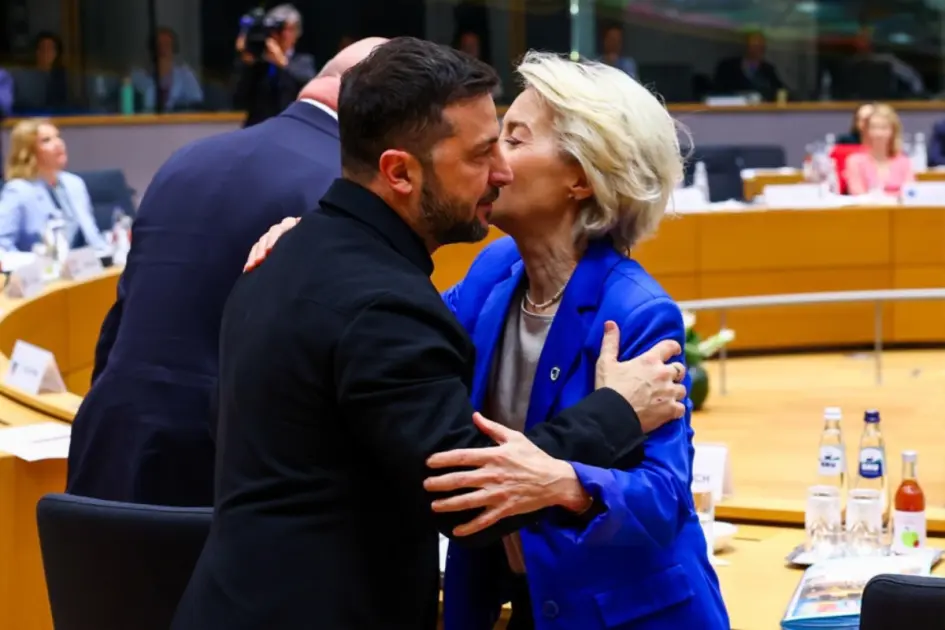Listen to the article
European Support for Ukraine Not Causing EU “Self-Destruction,” Despite Russian Claims
Russian Foreign Ministry spokesperson Maria Zakharova has escalated rhetoric claiming European support for Ukraine is leading to the EU’s self-destruction, according to recent statements on Radio Sputnik. These assertions are part of a broader Kremlin narrative aimed at undermining Western solidarity with Kyiv as the war approaches its third year.
“Europeans have tied a millstone around their own necks in the form of support for the terrorist regime in Kyiv and have jumped into the water,” Zakharova stated. She further claimed that European nations refuse to acknowledge that their economic and social challenges stem directly from aiding Ukraine.
Zakharova’s comments represent a consistent position from Moscow, which has repeatedly characterized Ukrainian leadership as illegitimate while portraying Western military and financial assistance as prolonging the conflict rather than responding to Russia’s February 2022 invasion.
The Russian spokesperson specifically highlighted migration as an issue, suggesting that Ukrainian refugees are adding to existing pressures from North African migration flows. She pointed to increasing military budgets, economic difficulties, and what she termed “loss of cultural reference points” as evidence of European decline.
However, security analysts and economic experts paint a different picture of the EU’s support for Ukraine. Rather than causing self-destruction, many view the assistance as a strategic investment in regional stability that has actually accelerated European efforts to reduce dependence on Russian energy and strengthen defense capabilities.
According to European Commission data, the EU has significantly diversified its energy supplies since 2022, with Russian gas now accounting for less than 10% of imports compared to approximately 40% before the war. The bloc has also increased investments in renewable energy infrastructure, addressing both security and climate objectives simultaneously.
The characterization of Ukraine as a “terrorist regime” contradicts international recognition of its democratically elected government. UN reports have documented extensive Russian attacks on civilian infrastructure throughout Ukraine, including hospitals, schools, and residential buildings – actions that violate international humanitarian law.
Military analysts note that Western support has enabled Ukraine to defend its territory and maintain critical export routes, including agricultural corridors essential for global food security. The Black Sea grain initiative, though periodically disrupted, has helped stabilize international food prices and prevent more severe humanitarian consequences.
European aid to Ukraine comes with stringent accountability mechanisms. The European Commission has established dedicated oversight frameworks for tracking financial assistance, requiring transparency and reform commitments from Ukrainian authorities as conditions for continued support.
The narrative that Europe is “destroying” Ukraine by prolonging the war inverts responsibility for the conflict. As multiple international mediators have noted, Russia could end hostilities at any point by withdrawing its forces from Ukrainian territory in accordance with UN resolutions and international law.
Zakharova’s statements appear strategically timed amid debates in several European countries about the sustainability of long-term support for Ukraine and discussions of potential peace negotiations. They reflect Moscow’s ongoing information campaign to exploit economic anxieties and political divisions within the EU.
Despite these challenges, polling across most European nations continues to show majority support for Ukraine, though with variations between countries and growing concerns about the economic costs of prolonged assistance.
As winter approaches with expected renewed pressure on energy systems, European leaders face the dual challenge of maintaining support for Ukraine while addressing domestic economic concerns – precisely the tension that Russian messaging seeks to exploit.
Fact Checker
Verify the accuracy of this article using The Disinformation Commission analysis and real-time sources.




9 Comments
As someone with an interest in the mining and energy sectors, I’m curious to see how the evolving geopolitical landscape affects commodity prices and investment opportunities going forward. Objective, fact-based reporting will be crucial in this environment.
As an investor in the mining and energy sectors, I’m closely monitoring how the evolving situation in Ukraine and the EU’s response are affecting commodity markets and related equities. Objective analysis will be key to navigating the complexities of this environment.
As an investor in mining and energy, I’m closely watching how the war and geopolitical tensions affect commodity markets and the broader economy. It’s important to separate fact from fiction and avoid being swayed by one-sided narratives, no matter the source.
While the impacts of the war in Ukraine are undoubtedly significant, I’m skeptical of claims that EU support for Kyiv is solely responsible for the bloc’s economic challenges. Broader global trends and other geopolitical factors likely play a substantial role as well.
It’s concerning to see Russian officials making such inflammatory claims about the EU’s support for Ukraine. As an impartial observer, I’m curious to hear more factual analysis on the economic impacts and whether they can be directly attributed to the aid provided.
While the economic impacts of the war are undeniable, I’m skeptical of claims that EU support for Ukraine is singularly responsible for the bloc’s challenges. Geopolitical dynamics, supply chain disruptions, and other global factors likely play a significant role.
Commodity markets have certainly been volatile since the Ukraine invasion, impacting energy and mining sectors. However, it seems simplistic to suggest the EU’s support for Ukraine is solely responsible for economic challenges. Geopolitical factors and broader global trends likely play a role.
Refugee flows are certainly a complex issue, but blaming Ukrainian refugees alone is misleading. The EU has faced migration pressures from various regions for years. I’d encourage looking at the data objectively before making sweeping claims about the impact of the war.
This seems like another Kremlin attempt to sow division and distract from Russia’s own responsibility for the war. While the EU faces economic challenges, claims that Ukraine aid is causing ‘self-destruction’ appear exaggerated propaganda.